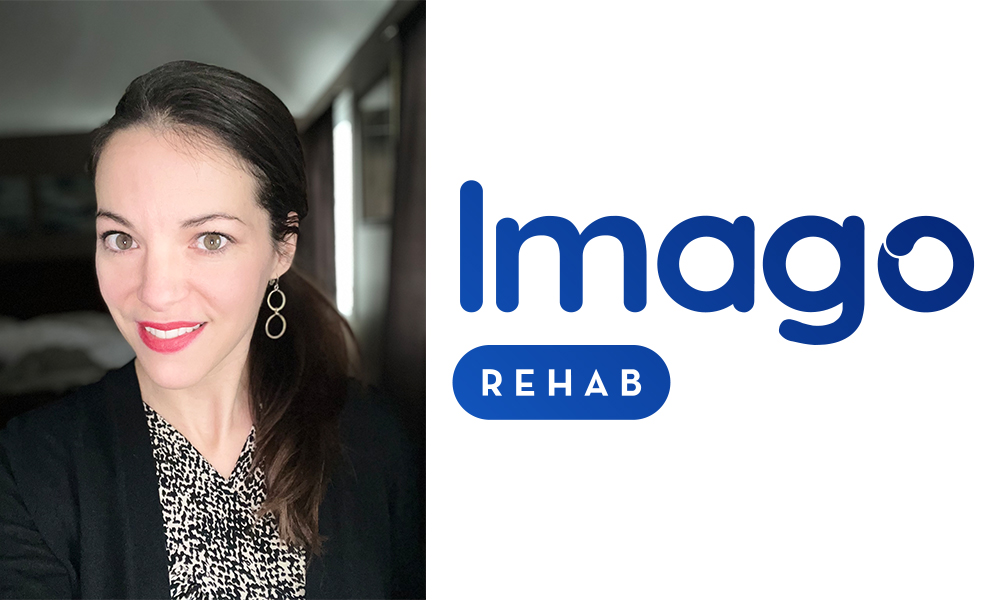Rehab reimagined: Alumna honored for innovations in stroke recovery
College of Health and Behavioral Studies
Kristin Nuckols (’07), a graduate of the inaugural cohort of the Master of Occupational Therapy program at JMU, received the Innovation Award from the National Board in Certification for Occupational Therapy for her revolutionary work in stroke rehabilitation as co-founder and Chief Clinical Officer at Imago Rehab.
Imago Rehab is a telemedicine occupational therapy practice specializing in neurological care, using innovative technology, including soft, wearable robotic devices, to provide personalized, evidence-based rehabilitation to stroke patients remotely.
“When you think about stroke recovery, you think about therapists who have to touch the person, help them move their body, stretch them, all these things that physically touch the person,” Nuckols said.
However, the telehealth approach is proving to be beneficial for clients receiving care through Imago Rehab, which provides services in seven states across the U.S.
Nuckols shared that there are “huge barriers” to receiving stroke rehabilitation services, including finding a local stroke specialist that has openings and accepts the patient’s insurance, along with finding transportation to appointments, as only 30-60% of stroke victims return to driving.
“Telehealth can be a convenient mechanism for people who don’t have the transportation they need to get therapy or don’t have a specialist in their area,” Nuckols said.
Beyond convenience, the practice also provides uniquely personalized care that allows patients to perform exercises in the comfort of their own home. Clients are able to practice skills needed for their everyday activities, such as personal care or chores.
Imago Rehab is working to create software innovations that provide documented processes for practice exercises to do independently that uses the patient as a model in their own home. This method is “easier for patients to engage with” by showing themselves “doing the motion they’re supposed to do, at home with their own stuff,” Nuckols said.
An especially unique feature of Imago Rehab is the soft, wearable robots Nuckols contributed to developing while working in the Harvard Biodesign Lab. With support from the Wyss Institute, Nuckols and collaborators were able to launch Imago Rehab as a startup in 2021.
“Our robot is completely made of fabric,” Nuckols said. “When you think of a robot, you think of something metal and humanoid.”
But this wearable robot works by attaching to a clenched hand, a common effect of stroke. The fingers of the glove can be stretched over onto each finger on a closed fist. The fingers of the glove are fitted with balloons, which inflate when they sense small movements in the hand, in order to extend the fingers.
In the instances where this robot could provide therapeutic services, “the hand is okay, but the brain is the problem,” Nuckols said. As clients work to reconnect the brain function to physical movement, the robot supports strengthening the connection.
Nuckols continues to contribute to the technological research and development for other robotic devices that support stroke recovery therapies.
“I’m a co-primary investigator on a $5 million grant with the U.S. National Science Foundation. Part of what we’re doing at Imago is creating the next generation of robotic tech. Our team gets to support that grant and think about the commercialization side of the next robot,” Nuckols said.
Nuckols’ interest in the field of occupational therapy began in her adolescence, growing up in Harrisonburg. “I decided I wanted to be an OT when I was 13,” Nuckols said. After a hand injury, she wasn’t able to participate in sports, and day-to-day activities became painful. After receiving care for the injury, Nuckols thought that “OT seemed like a really interesting job,” and decided to pursue a career in occupational therapy.
After completing her undergraduate degree at JMU, Nuckols was able to transition to the first class of the MOT program.
“I was glad they initiated the master’s program while I was there. It fit right with the year I was in, so I just went straight from my junior year into the master’s program,” Nuckols said.
She was deeply impacted by the research component of the master’s program. “I was always a student who loved to read the research articles. And ironically, that’s my job now,” she said. “I’m really glad that was part of what I learned.”
“Research is a story,” she said. “You shouldn’t just make cool tech because you can. You should try to fill a gap in the literature. You need to solve real world problems that are reimbursable.”
Nuckols also credits the Occupational Therapy Tutorial course as “instrumental” in her occupational therapy education. The class is a case-based discussion seminar for small groups of students, which aims to develop key practical skills related to occupational therapy.
Nuckols describes the course as very similar to real-world experiences providing occupational therapy in clinic, hospital, or telehealth settings, since students work through case studies in which they must consider factors contributing to issues, cultural backgrounds, and other influences to piece together an appropriate solution for a patient.
After graduating from JMU, Nuckols went on to pursue a Doctorate in OT at Boston University in 2020, which is where she developed the concept for Imago Rehab.
Nuckols “felt so confident going into the real world” thanks to the thorough preparation provided by James Madison University's Occupational Therapy program.
“You’ve got to be the change,” Nuckols said, “You’ve got to step up and take opportunities when they present themselves to you or go find your opportunity and make it happen.”
Imago has a seed capital round open with special opportunity availability to the JMU community. Interested parties may contact c.dugan@ImagoRehab.com.
